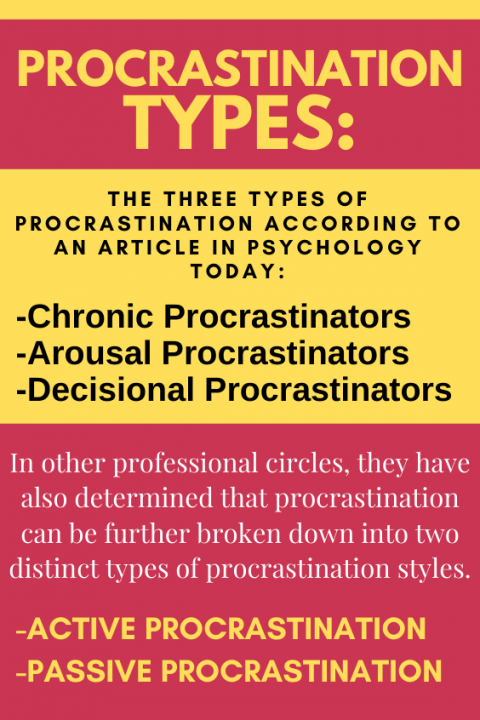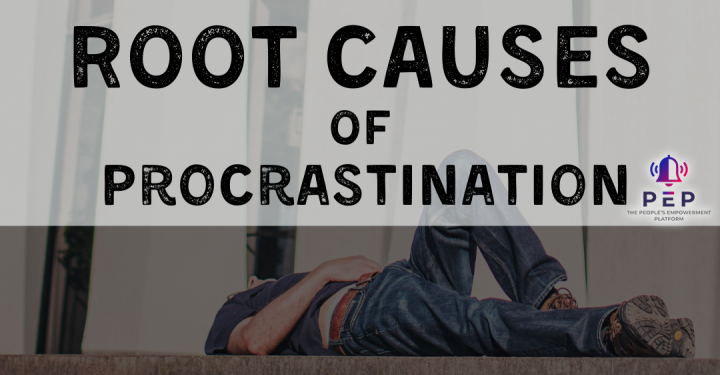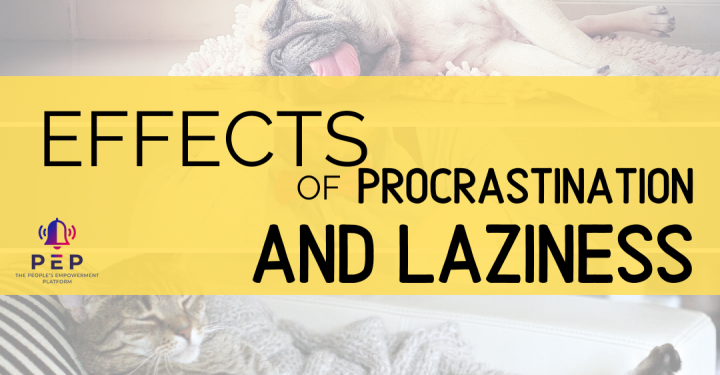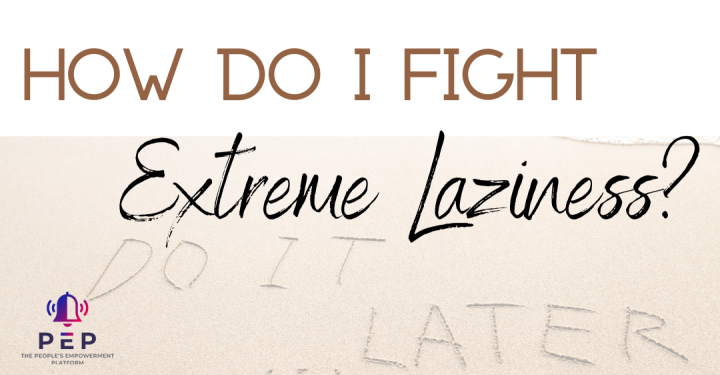Member Sign In
Login with email and password
No account yet? Register Now

Procrastination goes beyond those moments in high school or college where we put off homework until the last hour. The nuances of procrastinating extend far beyond waiting until the last minute to find out what to wear. Some of the common things people procrastinate about are:
"It is estimated that in 2002, $473 million dollars of over-payments were collected in taxes just because of people procrastinating instead of taking the time to get their taxes done correctly".
In this discussion, we are going to try and answer the question – is procrastination a choice or rather a genetic predisposition?
First, let’s define the term in the most scientific way available.
Procrastination is the act of delaying less urgent tasks and performing more urgent ones. It also means substituting those tasks for more pleasurable tasks and assigning the less urgent tasks for a later time.
For the term procrastination to apply correctly to a situation, the task must be counterproductive, needless, and delaying. The delay must have an implication of providing a worse-off type of circumstance as a result of the putting off the task.
It is the expressed gap between intention and action. In essence, the coined term procrastination does not mean to merely delay something.
In preparation for this article, we discovered there are several expert opinions on the varying types of procrastination - some say 3, others say 4, or even 5.
What we have done is narrowed down all the types to help you better identify what best describes your own manner of procrastination. So let’s begin!
“What I’ve found is that while everybody may procrastinate, not everyone is a procrastinator,”
Says APS Fellow Joseph Ferrari, a professor of psychology at DePaul University. He is a pioneer of modern research on the subject, and his work has found that 20 percent of people may be chronic procrastinators.
“It really has nothing to do with time-management,” he says. “As I tell people, to tell the chronic procrastinator to just do it would be like saying to a clinically depressed person, cheer up.”
Procrastination Types
The three types of procrastination according to an article in Psychology Today:

In other professional circles, they have also determined that procrastination can be further broken down into two distinct types of procrastination styles.
An article in the Journal of Social Psychology cites that there are positive effects associated with an active procrastination style with regards to attitude and performance.
It is suggested that though this type of procrastination is often regarded as self-handicapping and part of dysfunctional behavior, it is not all bad.
They cite active procrastinators are actually quite positive in nature and exhibit higher than average self- esteem. They prefer to work under pressure.
Active procrastinators make deliberate decisions to procrastinate. In contrast, the study indicated passive procrastinators are paralyzed by indecision.
Procrastination Consequences, Contributors, and Corrective Action
Psychological Factors That Contribute to All Types of Procrastination

Contrary to popular thinking, procrastination is not due to laziness. Though a lackadaisical nature might be a contributing factor, it is not the primary reason for putting off things. Science says there are other reasons for the behavioral choice. Psychological contributors could include:
The Negative Effects of Procrastination

The effects of procrastinating can be crippling. They can range from not meeting deadlines, missing scheduled appointments, and missed opportunities. It can also be internally upsetting, meaning it can take a toll on your health. Other effects include:
Procrastination statistics suggest that 40% of people have experienced financial loss due to procrastination (Gura, 2008)
Styles of Procrastination
1. Hyperbolic discounting/exponential discounting.
Hyperbolic discounting is the preference for a reward that arrives sooner rather than later. An example might be: Someone that prefers one dollar today as opposed to three dollars a week later or one who chooses to enjoy a video game as opposed to working. The idea of working for a paycheck that is weeks away versus enjoying something that provides immediate satisfaction. Additionally, the farther away the reward, the more the delay is substituted for an immediate award. It should also be noted that the immediate award almost always provides a dopamine response. The old adage could be applied here for these types of procrastinators – “A bird in the hand is better than two in the bush.”
2. Temporal self-discontinuity or temporal disjunction.
This is best characterized by short term mood evaluation. There is a break down between the present and future self. Generally speaking, those who exhibit temporal disjunction procrastination behaviors must engage in pre-work ritual such as exercise or meditation before resuming work activities. In most cases, the ritual is positive and able to replicated over and over. Other times, the ritual is negative i.e. drinking or drugs. The need to improve one’s set of circumstances, mood, or outlook is the chief defining reason for the delay. The person who uses this type of procrastination style believes his or her best work won’t be performed well without a correction of mind, body, or mood.
3. Analysis paralysis or choice paralysis
Choice paralysis occurs most often as a result from overthinking. Perhaps there are too many choices, or the lack of confidence in making them.
4. Self-handicapping
Self-handicapping is best witnessed in symptomatic issues like test anxiety. These issues are driven from a place of low self-esteem or confidence. They also can be a direct result of underpreparing or inadequate practice.
5. Hedonistic delay
Hedonistic delay is about honoring the need for instant gratification. The mentality behind this type of procrastination style is a substitution for something more delightful than the task. An example might be seen in the statement, “It would be a shame to not go out and enjoy this beautiful weather – boating sounds great. I can do this later.”
Correcting Procrastination Behaviors

The big question – How do I stop procrastinating so much? Much the same with any modification of behavior, there isn’t a one-stop answer or a magic pill. It is a practice of planned substituted behaviors that can overtime contribute to overall success. A better word might be management. Procrastination traits can creep back up in time if not careful. However, the experts recommend the following:
Interesting Clinical Studies
Study 1. Title: Procrastination and Stress: Exploring the role of self-compassion.
A study written by Fuschia M. Sirois and published in February 2013 in the Journal of Self & Identity.
This study was conducted with the knowledge that procrastination produces higher than average levels of stress. The study aimed to investigate self-compassion as a mediator of the relationship between trait procrastination and stress.
It involved four sample groups:
How they conducted the study parameters:
They used what is referred to as a meta-analysis. This is where they combine statistics and data to formulate a result across the four study groups based on the same question.
The results:
The result of the study indicated that in all four samples, self-compassion was a factor between stress and procrastination. It was found that low self-compassion(esteem) contributed to negative outlook and behaviors.
This explained the high levels of stress associated with procrastinating type behaviors. Interventions to boost levels of self-compassion would help to decline stress and help correct behaviors.
Study 2. Title: Procrastination in Daily Working Life: A Diary Study on Within-Person Processes That Link Won’t Work Characteristics to Workplace Procrastination.
Written by: Katja Hoffman and published in Frontiers of Psychology in July of 2018.
Conducted by: Multiple authors associated with various professional and educational venues.
Study Overview: The goal of the study was to measure self-regulation in a work environment citing that negative consequences would alter procrastination.
The study focused on three specific work characteristics that we expected to trigger both challenge and hindrance appraisal simultaneously.
The three characteristics were: Time Management, Planning, and Problem Solving.
The study was conducted via a work diary where three measurement notations were assessed daily over a period of 12 days. 110 Employees were measured. The measurement tool was MSEM (multi-level structural equation modeling which was controlled for sleep quality and occupational self-efficacy.
The results:
The results indicated a negative indirect effect of time pressure on workplace procrastination. The objectives were met and showed that work place characteristics linked directly to workplace procrastination.
The clinical study found it inconclusive as far as the triggering of additional workplace stressors and they would have to further isolate certain challenge stressors to determine if it equated directly to workplace procrastination.
Study Conclusion:
In layman’s terms, they placed a determination quotient upon what stressors would lead to procrastination and if self-regulation played a factor.
The results determined that all three characteristics played a role. However, whether they were psychological based procrastination versus situational based procrastination was declared neutral.
Discussion Highlights
This discussion contained education, examples, and interesting case studies on the science of procrastination. My purpose was to help shed light on a behavior that sometimes can have debilitating effects.
Takeaways:
1. The research indicated that procrastination behaviors all have root cause or contributor and has little to do with necessary laziness. Some of the causes stem directly from medically-related issues such as ADHD, Panic/Anxiety Disorder.
2. We also learned that the procrastination type differs from person to person. Procrastination types can fall into the following categories: Chronic, Arousal, Decisional, Active, and Passive.
3. In the first clinical study provided, it was evident that there is a direct correlation between procrastination, self-esteem and higher than average stress levels.
4. Through the Clinical Study #2, research data revealed that self-regulation is very difficult to even with a potentially negative consequence.
5. We outlined some distinct procrastination styles. These styles help to further define the type of procrastination you yourself might use in everyday situations and circumstances.
6. Procrastination is something that can be improved upon, however, your success relies upon learning as much as you can about your specific procrastination style. Once, you have learned everything you can, a plan for improvement can be put into play.

What type of Procrastination style do you think you might have?
Share your insight in the comment section and qualify to win free hoodies, t-shirts and hats.
If you enjoyed this content, please go to your iPhone App Store or Google Play and download ThePEP app. You can follow me there at @RomanyMalco. This allows me to notify you of my posts without email.
Doesn't matter what platform you follow me on. I'll just buzz you through the PEP app and when Instagram, Twitter, Facebook, YouTube, etc. changes their algorithm you and I don't lose contact.
Thank you for being a part of the PEP Profile community. If you’re not yet a member but would like to join the discussion, you can also request an invitation at PEPPROFILE.COM. We love you.
REFERENCES:
https://www.mindfithypnosis.com/what-is-procrastination/
https://www.medicalnewstoday.com/articles/325780.php
https://insights.breather.com/the-science-behind-why-we-procrastinate/
https://en.wikibooks.org/wiki/Overcoming_Procrastination/Chronic_Procrastination
https://www.growthramp.io/articles/hyperbolic-discounting
https://onlinelibrary.wiley.com/doi/abs/10.1111/spc3.12011
https://procrastination.com/blog/9/decision-paralysis-overthinking-choices
https://psychology.iresearchnet.com/social-psychology/self/self-handicapping/
https://www.tandfonline.com/doi/figure/10.1080/15298868.2013.763404?scroll=top&needAccess=true
https://www.mindtools.com/pages/article/newHTE_96.htm
https://www.frontiersin.org/articles/10.3389/fpsyg.2018.01087/full
Login with a social network